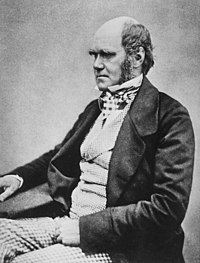 [div class=attrib]From Discover:[end-div]
[div class=attrib]From Discover:[end-div]
Charles Darwin would have turned 200 in 2009, the same year his book On the Origin of Species celebrated its 150th anniversary. Today, with the perspective of time, Darwin’s theory of evolution by natural selection looks as impressive as ever. In fact, the double anniversary year saw progress on fronts that Darwin could never have anticipated, bringing new insights into the origin of life—a topic that contributed to his panic attacks, heart palpitations, and, as he wrote, “for 25 years extreme spasmodic daily and nightly flatulence.” One can only dream of what riches await in the biology textbooks of 2159.
1. Evolution happens on the inside, too. The battle for survival is waged not just between the big dogs but within the dog itself, as individual genes jockey for prominence. From the moment of conception, a father’s genes favor offspring that are large, strong, and aggressive (the better to court the ladies), while the mother’s genes incline toward smaller progeny that will be less of a burden, making it easier for her to live on and procreate. Genome-versus-genome warfare produces kids that are somewhere in between.
Not all genetic conflicts are resolved so neatly. In flour beetles, babies that do not inherit the selfish genetic element known as Medea succumb to a toxin while developing in the egg. Some unborn mice suffer the same fate. Such spiteful genes have become widespread not by helping flour beetles and mice survive but by eliminating individuals that do not carry the killer’s code. “There are two ways of winning a race,” says Caltech biologist Bruce Hay. “Either you can be better than everyone else, or you can whack the other guys on the legs.”
Hay is trying to harness the power of such genetic cheaters, enlisting them in the fight against malaria. He created a Medea-like DNA element that spreads through experimental fruit flies like wildfire, permeating an entire population within 10 generations. This year he and his team have been working on encoding immune-system boosters into those Medea genes, which could then be inserted into male mosquitoes. If it works, the modified mosquitoes should quickly replace competitors who do not carry the new genes; the enhanced immune systems of the new mosquitoes, in turn, would resist the spread of the malaria parasite.
2. Identity is not written just in the genes. According to modern evolutionary theory, there is no way that what we eat, do, and encounter can override the basic rules of inheritance: What is in the genes stays in the genes. That single rule secured Darwin’s place in the science books. But now biologists are finding that nature can break those rules. This year Eva Jablonka, a theoretical biologist at Tel Aviv University, published a compendium of more than 100 hereditary changes that are not carried in the DNA sequence. This “epigenetic” inheritance spans bacteria, fungi, plants, and animals.
[div class=attrib]More from theSource here.[end-div]
